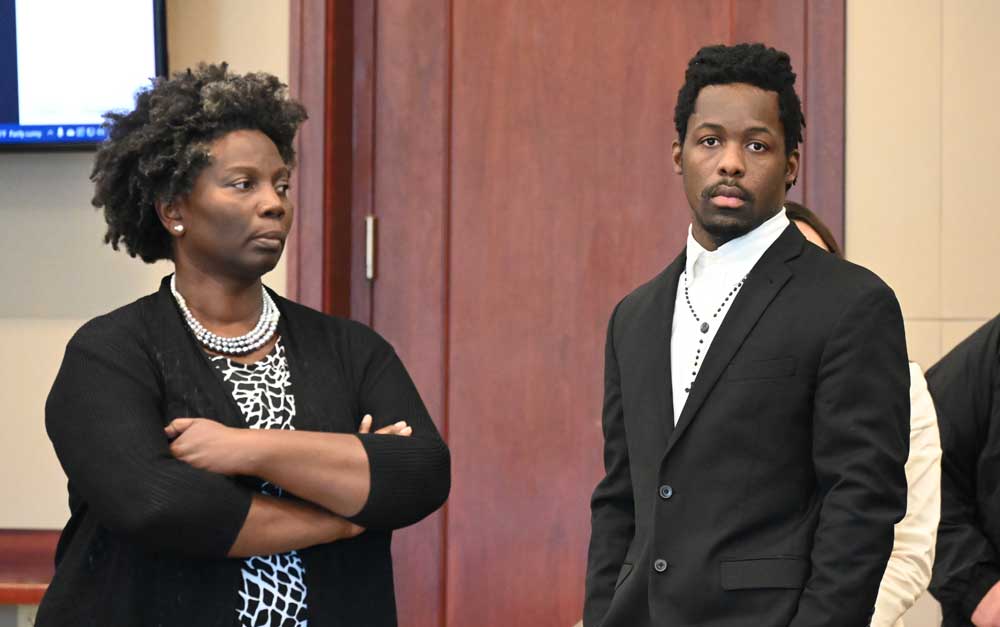
Almost an hour into its deliberations in the rape trial of Kwentel Moultrie today, the jury had a question: “Is it state law that a 16 year old having sex with a 20 year old man is statutory rape by a 20-year-old man,” and “Can a 16 year old give consent to sexual intercourse with a man 18 years of age or older”?
Setting aside the overt and telling sexism of the questions, the answer to the first question is no: unlawful sexual activity, or statutory rape, applies when the assailant–whether man or woman–is over 23 years old, having sex with a 16 or a 17 year old. The answer to the second is yes, as long as the older person is younger than 24, and the younger person is not younger than 16.
Either way, Circuit Judge Terence Perkins did not answer the two questions. He told the jury that it had heard all the evidence–it had been a five-day trial, four of it with the jury–he had provided his instructions on the law, and no other applicable laws than those he addressed applied. He had never referred to the applicability of statutory rape or consent laws, which implicitly meant that they did not apply: it’s not what Moultrie was on trial for. He sent them back to the jury room to continue deliberating.
After three hours and 43 minutes of deliberation, the all-white jury of four women and two men returned with a verdict. Moultrie, now 23, was guilty of first-degree rape of a 16-year-old girl in 2019, when he was 20.
There was no issue of age or unlawful sex in this trial. Either he had forced himself on the girl or he had not. So if the jury in any way took account of the age difference, it reached an unjust or unlawful verdict. If the jury took into account the equally irrelevant fact that Moultrie is a man (a Black man at that, rarely a minor factor on juries rich in cognitive bias), and the victim a girl, the law being silent on gender differences as this jury clearly was not (based on the wording of its questions), then it reached an unlawful or unjust verdit.
Of course how the jury reached its verdict cannot and will not be known on the record by the court, even if jurors speak of it publicly later, making the if’s of the verdict irrelevant, too, and those two questions the only window–gaping though it was–into the jury’s thinking. The only matter of relevance today was the guilty verdict on a first-degree felony rape charge that now exposes Moultrie to up to 30 years in prison, a minimum of eight years, plus the designation of a sexual predator. The sentencing date has not been set.
Olivia (*), the prosecution’s chief witness, immediately broke down in sobs at the verdict and was held by a friend on one side and a victim’s advocate on the other, before Assistant State Attorney Melissa Clark walked over (after the judge had left) and hugged her, thanking her for her role, and for giving a voice to Emily, the victim who had not appeared at any point in trial or pre-trial proceedings. Olivia, whether in person or not, had endured the most withering attacks from the defense–even more than those the prosecution launched on Moultrie, since the attacks on Olivia went directly to her behavior.
A dozen members of Moultrie’s family and friends had gathered in the courtroom for today’s closing arguments, more than a dozen for the verdict, including Moultrie’s mother, who also reacted to the verdict with sobs, her head bowed on the pew in front of her, then louder protests as family members ushered her out of the courtroom. Moultrie had stood ramrod for the reading of the verdict, but his eyes later reddened, he clutched his face in his hands, and his attorney, Regina Nunnally, held him.
This was not Moultrie’s first trial on this charge. In April, an all-white jury of five women and one man could not reach a verdict. They’d deliberated two hours and 40 minutes. Perkins declared a mistrial.
It wasn’t a mystery why. The case is a puzzle on many levels. The behavior of the girls involved was a puzzle, though they were teens: their irrationality was not a surprise. Moultrie was 20. He acted even more recklessly than the girls. The prosecution’s approach was a puzzle, if a revealing one. It had offered Moultrie a deal: a first degree rape charge reduced to child abuse, still a felony, but in the third degree. Instead of the possibility of a minimum of eight years in prison, and a maximum of 30, he’d get no prison time. Just five years on probation. Another puzzle: He turned it down. Probation conditions would have barred him from seeing his children. He could not abide that.
The state yanked the offer after he was rearrested on a second degree murder charge stemming from a home invasion in the R Section last December. He did not pull the trigger that killed a man during the alleged heist, but since he was in the act of committing a crime, he was charged for the murder. That case is pending.
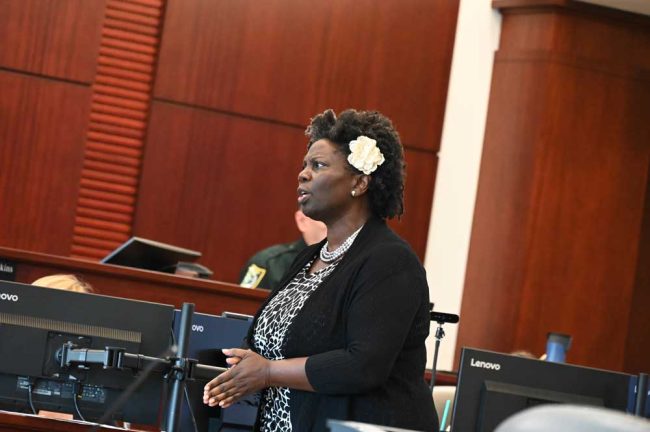
Still, the state’s initial offer of a plea deal was revealing because it betrayed the weakness of the state’s case. That weakness had to do with yet another puzzle: the alleged victim did not testify, leaving the case to be built around her friend, a flawed witness for the simple reason that she was pass-out drunk and vomiting at the time of the alleged rape.
The jury in the rape case heard none of that: not the plea deal, not the subsequent murder charge, not even why the alleged victim did not testify. Nor did the jury hear that the rape case went to trial once before and resulted in a hung jury. Nor even that, when the defense asked Moultrie where he worked and he said Taco Bell, that he was lying: that’s where he used to work, before spending the last six months at the Flagler County jail on the murder charge and on the revocation of his bond for the rape charge. But the jury isn’t told those things so as not prejudice it against Moultrie. It must see the case with a blank slate.
So it did. Clark and Nunnally, with co-counsel Alexis Nava-Martinez, presented the same case, if with richer visuals–pictures and video that, ironically, made the alleged victim’s absence even more pronounced.
The case revolved around the events of a night in June 2019 in Palm Coast. Emily(*) was 16. She had gone to school in Flagler but had moved to Maryland. She was visiting her friend Olivia back in Palm Coast, having traveled down alone. Olivia was staying the night at her sister Chastity’s house in the P Section.
Chastity was asleep with her boyfriend and her puppy when the girls partied at the other end of the house. They got two bottles of vodka, which they drank in their entirety as they played a game called “Let’s Get F’ed Up.” They did. They also invited friends over, then after midnight went to Walmart and Steak and Shake, where someone invited Moultrie and his friend “Linko” over. The whole group returned to the P-Section house before everyone was told to go home.

By then Olivia was passed out, in bed. Emily ran out to Moultrie and told him to return after everyone left, though the two had never met before. He did, with Linko. Emily let them in through a back bedroom door. They slipped into the same bed with her and Olivia. Then there was either consensual sex between Moultrie and Emily or a rape. He said she was “reaching back, rubbing on my penis,” he was rubbing on her vagina, and things took their course from there. She never refused sex, he said, and afterward she was “on her phone.”
Olivia testified that her friend cried, told Moultrie to stop, and after he left, said she was raped.
Moultrie, after denying to detectives that anything had happened, said it was consensual sex: his DNA, detected from sperm, was inside Emily, on her underwear, on a comforter.
But this is not a case of he-said-she-said since there was no she in this trial. The state relied chiefly on Olivia for its case, a star witness Nunnally repeatedly ridiculed, the way she did when she showed the jury a brief video of the girls at Walmart, with Olivia twerking, drunk, while being pushed in a shopping cart.
“Look at her. Sloppy drunk. This is the state’s star witness? This is the best you can do? Oh my God,” Nunnally told the jury in her closing argument today. Emily is then seen runing =across the frame. “That was Emily just running in flipflops, clicking her heels like she’s on the ‘Sound of Music.’ Look at this. One, two, look at her. Oh, but she’s so drunk. All that dexterity for somebody who’s supposedly so drunk. You heard that Emily was the least drunk of all of them. You could tell that Olivia is gone. Gone with the wind. So she wouldn’t know what was going on. Her ability–if this was a DUI, she would have been done for.”
Nunnally was attempting to convince the jury that Emily was in control of her capacities and could not have been taken advantage of.
Clark focused on Moultrie’s many lies. Deputies only showed up to his house to get a DNA sample eight months after the incident (the delay was never explained, though DNA testing through the Florida Department of Law Enforcement in rape cases had been notoriously slow at the time and was just then catching up). But when they did, Moultrie, in a recording, lied: “I never fucked her that night.”
Every trial has its striking moments, hinges that prove either fatal or fortunate to the defendant. One of those occurred during Moultrie’s interview with Flagler County Sheriff’s detective Andrew Cangialosi, the interview the jury heard in full. It wasn’t even that Moultrie lied about not having sex with the alleged victim. It was the crude, rawly deadpan way he talked about sex, about women and girls.
In a defense that hinged on consent, he did not sound like a man who sought consent, but rather like a man who took what he could, however he would, even from a 16-year-old drunk girl, and lied if he got in trouble.
“So how did you DNA end up inside her vagina?,” Cangialosi asked him. “The evidence doesn’t lie.”
“I didn’t fuck her that night,” he insisted, “I did not.” He’s heard saying something incoherent about a “bitch” or “bitches,” another indication of his respect, such as it was, for women and girls. In court he claimed he lied to deputies because he was scared, he had a child on the way, he was speaking in front of his mother and didn’t want to talk about sex, though Clark, who called Moultrie’s explanations “utter nonsense,” showed he’d had no problem talking about sex with another girl. He said he was scared of being surrounded by 10 cops with long guns, but Clark showed body cam video showing at most four cops, none with long guns (some could have been behind the house), and some were dismissed during the DNA collection.
Moultrie had told other lies to detectives–that “everybody’s fucking” (no one was: every other witness who testified refuted the claim), he had lied even to Olivia the day after, telling her in a text that he’d had sex with Emily, that Emily wasn’t his type, and he had asked a friend who testified in court to lie for him.
“And he wants you to believe what he’s going to tell you on that stand even though he’s got this pattern of lies that have been happening leading up to this testimony to you earlier this week,” Clark told the jury.
Moultrie himself did not make the best impression when he testified during his first trial, nor did he in his second trial, for the same reason: he came across as curt, detached, robotic. If there was any warmth to him, he did not show it. Rather, this was the man to whom sex was “fucking” and women or girls were barely named objects to be fucked. But he wouldn’t be the first man nor the three billionth to act that way, and those billions don’t face rape charges for it. At the same time, if neither testimony was going to endear him to the jury, his first hadn’t alienated them, either. That may not have been the case in his second.
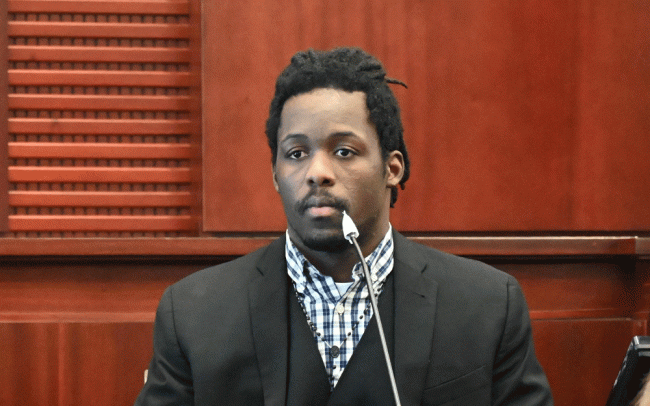
As in his first trial, he was straight-forward when he testified Wednesday, unemotional, seeming neither bitter nor magnanimous. He said the strictest minimum, did not tussle or play coy with Clark when she cross-examined him (the way Olivia at one point did when she was cross-examined by Nunnally), and did not give the prosecution an opening to cast him as a predator. At worst, he came across as a young, cold, indifferent, not particularly brilliant man who indulges his urges when given a chance. Who takes what he can and covers his tracks.
Clark cobbled that with Olivia’s testimony to win a conviction.
Olivia had described the incident, how she’d woken up–to vomit–to seeing “a shadowy figure,” over Emily and Emily crying and repeatedly saying stop, stop. There’s a gap in the narrative here, the way Clark told the story. She jumped straight to Olivia having the boys leave the house to getting back to her friend. She returns to her friend crying and saying repeatedly, ‘he raped me, he raped me.’ And then a short time later, Emily wakes her up again saying ‘my body hurts, my body hurts,’ and she’s hysterical, asks her friend to examine her vagina. Is that the behavior of somebody that just had consensual sex? No, because this was not consensual. She had just been sexually battered by that man.”
Nunnally described it very differently. She squarely portrayed Emily as having full agency over what happened as a preface to consensual sex with Moultrie: “She pursued him, he told you that she came up to him, they even exchanged numbers, and she said, Emily said, come back when everyone’s gone. Well, what does that mean?” Nunnally said. “So what did Emily do? What was her behavior? She opened the door for him and Linko. For two men, two young men to walk into someone else’s house, into somebody else’s bedroom and someone else’s bed.”
Nunnally then explicitly blamed the alleged victim: “Emily’s behavior is on trial here, Emily that [has] these two guys in someone else’s house, in the bed, and the state said there’s no evidence of consent? Why do you invite the boys back into your house at three o’clock in the morning, play Yahtzee? I don’t think so. That’s unreasonable.”
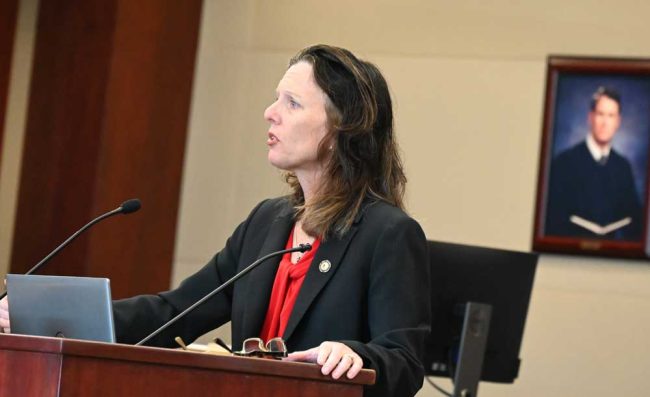
The prosecution had a problem: how to rationalize the fact that Emily had urged Moultrie to come back, had unlocked the door form him, had presumably allowed him in the bed, along with Linko, without so much as a sound that woke up Olivia? Clark unconvincingly attempted to discredit the claim that Emily had invited them in, if more fairly argued that it was “another leap that she planned on having sex with him.”
“This is a young lady that made a lot of bad choices that night,” Clark argued, “and like most teens, doesn’t want to face the consequences of her bad choices of drinking and partying, having people around the house. But does that take away from the fact of what happened that night? No. Did she make poor choices in how to resolve the issue? Yes. But ultimately does the issue get resolved? Yes. Does Emily end up in the hospital? Yes, she does. And is that the actions of somebody that didn’t have consensual sex? No. Someone who has consensual sex is not going to undergo a sex assault exam.”
Nunnally objected to Clark speculating. The judge overruled.
And there was that trip to AdventHealth Palm Coast nearly two days after the incident, when Emily had a sexual assault exam: not the typical behavior of a teen looking for an STD exam, as Nunnally had attempted to say before she was shut down by an objection.
“This is a young lady who was sexually battered, was down here, didn’t know how to resolve that issue,” Clark closed, “so went to a bunch of clinics because they’re teenage kids, and then eventually wound up at the right place, a hospital where she got the help she needed.” It was there that she made contact with a deputy for the first time. The investigation started. And the net began closing on Moultrie.
![]()
(*) All names of the alleged victim and her friends are pseudonyms. That of Kwentel Moultrie is not.
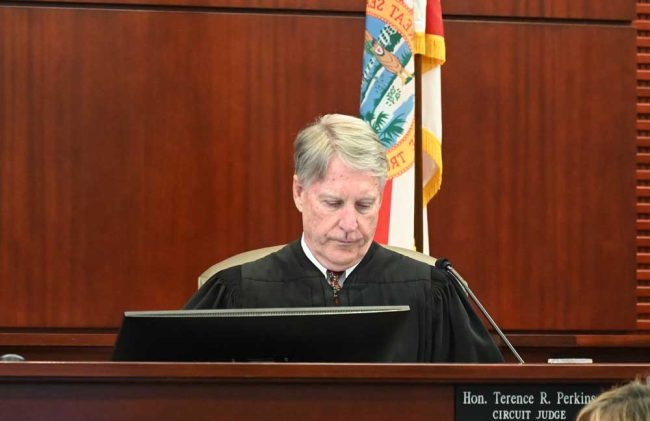





























ASF says
I hope the victims in this case are gettng some intensive conseling. It sounds like they are going to need it for some time to come.
DV says
The wording of the questions from the jury make sense given that they were mulling over a particular situation which involved a female as the alleged victim. To act like there was somehow is sexism involved feels like a really big stretch to try and sensationalize the ending of a case that doesn’t need any help being sensational.
Dan says
Mr. Moultrie’s actions are those of a Juvenal and the poor judgements are repeated.
This is the point where Mr. Moultrie assumes responsibility for his actions as we all agree to constitutionally.
He was judged rightly .
Timothy Patrick Welch says
Girls, do not invite men into your room…
Rizzie says
I am banned from free speech by Flagler Live for speaking the truth on the Tonda Royal case. Ms. Clark said in this case that people don’t get sexual assault exams if it was consensual. Tonda Royal was charged with Statutory Rape. That is consensual sex between adults and minors. But they got a sexual assault exam for that case. And the girl came to trial and testified that the sexual intercourse was accomplished by without her consent and against her will… And the State prosecuted Royal for Statutory Rape. Just read everything on the Tonda Royal case and compare Ms. Clark’s words. And more. Not saying the girl in the Kwentel case was not raped. But just showing how Royal was railroaded and the cover up is still active. He was falsely accused of rape if he was charged and prosecuted for Statutory Rape. Sexual intercourse accomplished by without the consent of the victim is Sexual Battery. Not the offense Royal was given 12 years for.
FlaglerLive says
The commenter wasn’t banned for speaking “truth,” but for spreading falsehoods, as the commenter does here. Reckless disregard for the truth isn’t free speech. There was no issue of statutory rape in the Moultrie case because age was not an issue. Only consent was. A jury found it was not consensual. There is no such thing as consensual sex between a 53-year-old person and a 16-year-old person. Even if the younger person consents, it is still statutory rape. The commenter is focusing on the prosecutor’s words, which are a foil. The evidence was incontrovertible in the case, other than Mr. Royal’s claim at one point that a different girl got hold of his sperm and inserted it in the victim’s vagina. The jury didn’t buy it.
Rizzie says
What is it called when a 52 year old man has sex with a 16 year old girl who said at trial that she was crying, did not consent, didn’t want to do it but he did it anyway, and Ms. Clark told the jury she felt disgusted by what just happened to her? Statutory Rape? Many people are aware that Flagler Live is fake news working with the courthouse to convict defendants guilty or not.